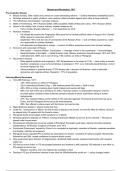Summary
AQA History A Level Summary Sheets for Russia (option 2N)
- Course
- Institution
- Book
Contains a double-sided summary sheet for each of the six sections in the component: dissent and revolution, Bolshevik consolidation, Stalin's rise to power, economy and society, Stalinism, politics and control, and the Great Patriotic War and Stalin's dictatorship. Designed to provide a quick and ...
[Show more]




